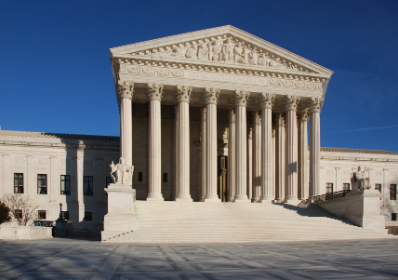
The Freedom From Religion Foundation is proud to be listed as an official supporting organization in the reintroduction yesterday of an important Supreme Court reform bill.
Rep. Hank Johnson, D-Ga., introduced the Supreme Court Ethics and Refusal Act in the House; Sen. Sheldon Whitehouse, D-R.I., introduced the companion bill in the Senate. FFRF supported the bill in the previous Congress and worked diligently to pass it out of committee. It would require Supreme Court justices to recuse themselves from cases in which they have a conflict of interest. The bill will also require the justices to adopt and follow a code of ethics, establishing advisory review by appellate court judges to ensure transparency standards over gifts and travel, as well as requirements to disclose lobbying and dark money interests before the court.
“We are seeing the effects of our inaction,” warns Johnson. “The word ‘unprecedented’ is starting to lose its meaning as we see more and more questionable behavior from justices.” Adoption of a code of ethics will help restore the court’s reputation, which is at an all-time low, and “reinforce that none of us — not even Supreme Court justices — are above the law,” adds Johnson.
Pressure began mounting for reform in 2021 after belated disclosure that Virginia Thomas, who is married to Justice Clarence Thomas, worked with the White House as an insider to overturn the 2020 presidential election prior to the Jan. 6 insurrection. Thomas notably had not recused himself from related cases.
FFRF wrote to Supreme Court Chief Justice John Roberts twice last year urging him to investigate infiltration of the high court by Christian nationalist advocates associated with Supreme Court litigants. Former anti-abortion crusader Rev. Rob Schenck alleges an improper leak and meeting between Justice Samuel Alito and two anti-abortion donors in 2014. FFRF, with secular advocates, had earlier sent a missive to the chief justice urging him to investigate reports by Rolling Stone magazine that Schenck’s group had met with and prayed with Alito and Thomas in the Supreme Court building.
The New York Times reports today that the Supreme Court has discussed whether to adopt a code of judicial conduct as early as 2019. Roberts went on record in 2011 saying the Supreme Court is not bound by the same code of conduct that applies to the rest of the judiciary and “has had no reason to adopt the code of conduct as its definitive source of ethical guidance.”
This public posture and inaction give all the more reason for Congress to act now, says FFRF co-president Annie Laurie Gaylor, adding thanks to Johnson for reintroducing this vitally needed legislation. “The Supreme Court is the ultimate arbiter of justice in our country, and it’s essential that its justices maintain the highest ethical standards,” Gaylor concludes.
FFRF would also like to thank Johnson for his commitment to preserving the constitutional principle of separation between state and church, and for being a stalwart member of the Congressional Freethought Caucus. Throughout his time in Congress, Johnson (who has appeared on FFRF’s “Freethought Matters” TV show) has been a strong voice for civil liberties, the rights of nonbelievers and for ensuring that religion does not play an undue role in government.
The Freedom From Religion Foundation is a national nonprofit organization with more than 39,000 members and several chapters across the country. It protects the constitutional separation between state and church and educates about nontheism.

